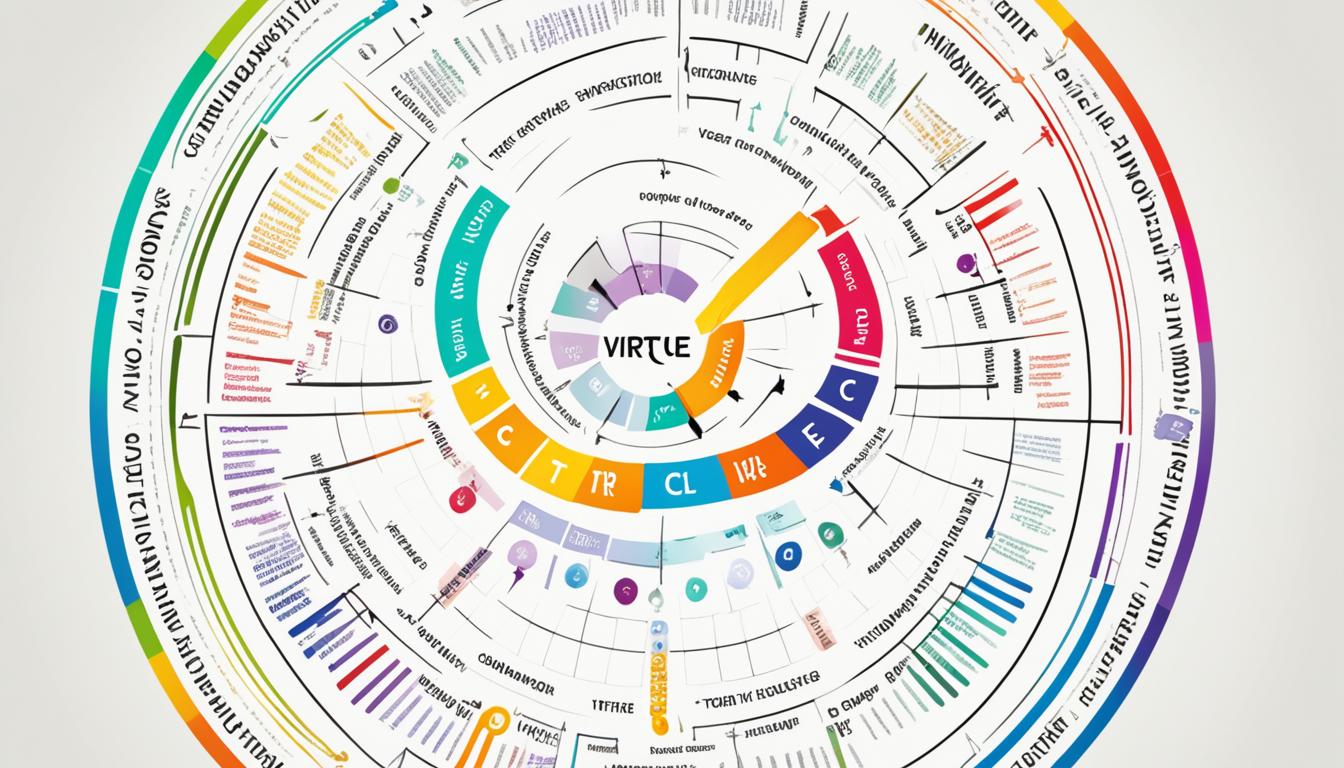The Avoidant Personality Disorder Test, created by IDRlabs, is a helpful tool for those looking to gain insight into their avoidant tendencies and behaviors. This test is based on the research of Dr. Donald R. Lynam and his team, who developed the Five Factor Avoidant Assessment (FFAvA). It is designed to give individuals a thorough understanding of their avoidant personality traits.
Key Takeaways:
- The Avoidant Personality Disorder Test by IDRlabs measures avoidant tendencies across eight domains.
- It can help individuals understand their avoidant personality traits and behaviors.
- The test is based on the Five Factor Avoidant Assessment (FFAvA) developed by Dr. Donald R. Lynam and colleagues.
- While the test provides valuable insights, it does not replace the need for professional diagnosis and treatment.
- If you suspect you have Avoidant Personality Disorder or are struggling with avoidant tendencies, it is important to seek guidance from a qualified mental health professional.
Understanding Avoidant Personality Disorder
Avoidant Personality Disorder (APD) is a psychological condition characterized by feelings of inadequacy, social inhibition, and hypersensitivity to negative evaluation. Those with APD tend to avoid social situations and relationships due to their fear of criticism, rejection, or disapproval. They often struggle with a negative self-image and low self-esteem.
Common symptoms of APD include:
- Excessive shyness: Individuals with APD may experience extreme shyness and discomfort in social settings.
- Avoidance of social activities: They may actively avoid or withdraw from social activities, including parties, gatherings, or public speaking engagements.
- Fear of engaging with others: There is a persistent fear of engaging with others due to the anticipation of criticism or rejection.
- Limited emotional expression: Those with APD may struggle to express their emotions or feel deeply uncomfortable doing so.
Understanding the symptoms and characteristics of APD is crucial for recognizing and supporting individuals who may be dealing with this disorder. By gaining insight into APD, we can foster empathy and create a more inclusive environment for those affected.
Individuals with Avoidant Personality Disorder often struggle with a negative self-image and low self-esteem.
The Importance of Self-Assessment
Self-assessment plays a crucial role in personal growth and understanding. By taking the Avoidant Personality Disorder test, individuals can gain insights into their avoidant tendencies and behaviors. This self-assessment can serve as a starting point for self-reflection and a journey towards understanding, acceptance, and growth.
Self-reflection allows individuals to examine their own thoughts, emotions, and behaviors. It provides an opportunity to identify patterns, strengths, and areas for improvement. Through self-assessment, individuals can gain a deeper understanding of how their avoidant tendencies may be impacting their relationships, career, and overall well-being.
The Power of Personal Growth
Personal growth is a lifelong process that involves continuous self-exploration and development. When individuals engage in self-assessment, they can uncover their blind spots and recognize areas where personal growth is needed. This awareness allows them to make intentional changes, develop healthier coping mechanisms, and foster positive relationships.
Self-assessment also empowers individuals to challenge negative self-perceptions and beliefs. By understanding their avoidant tendencies, individuals can work towards building self-confidence and strengthening their sense of self-worth. This journey of personal growth can lead to increased resilience, emotional well-being, and a more fulfilling life.
“Self-assessment is the first step towards self-improvement. It allows us to confront our fears and limitations, paving the way for personal growth and transformation.” – Dr. Emily Smith
The Role of Self-Reflection
Self-reflection is an introspective process that involves examining one’s thoughts, feelings, and experiences. It allows individuals to gain a deeper understanding of themselves and their motivations. By engaging in self-reflection, individuals can identify the root causes behind their avoidant tendencies and explore ways to overcome them.
Self-reflection also promotes self-awareness, which is essential for personal growth. It helps individuals recognize their strengths, weaknesses, and areas for improvement. Armed with this knowledge, individuals can set realistic goals, make informed decisions, and take actions aligned with their values and aspirations.
Through self-assessment and self-reflection, individuals can embark on a journey of self-discovery and personal development. It is a process that requires honesty, vulnerability, and a willingness to embrace change. By actively engaging in self-assessment and self-reflection, individuals can unlock their true potential and lead more fulfilling lives.
| Benefits of Self-Assessment and Self-Reflection |
|---|
| Gain insights into avoidant tendencies |
| Identify patterns and areas for personal growth |
| Challenge negative self-perceptions |
| Develop self-confidence and self-worth |
| Set realistic goals and make informed decisions |
| Promote self-awareness and emotional well-being |

Self-assessment and self-reflection are powerful tools for personal growth. By understanding and addressing avoidant tendencies, individuals can navigate their lives with greater self-awareness, confidence, and fulfillment.
Understanding the Avoidant Personality Spectrum
The avoidant personality spectrum encompasses a range of symptoms and characteristics that indicate a disposition toward being fretful, distracted, and alienated. Symptoms can vary in type and severity, but often involve feelings of inferiority, social ineptness, fear of rejection, and isolation.
The Avoidant Personality Spectrum Test aims to measure dependent personality occurrences across eight domains, providing a comprehensive assessment of avoidant traits. By evaluating specific symptoms and behaviors, this test helps individuals gain a deeper understanding of their avoidant tendencies and their impact on various aspects of their lives.
One of the primary symptoms within the Avoidant Personality Spectrum is dependent personality. People with dependent personality traits display an excessive need to be taken care of, struggle with decision-making, and fear being alone.
Here is a comprehensive breakdown of the characteristics and symptoms encompassed within the avoidant personality spectrum:
| Symptoms | Characteristics |
|---|---|
| Feelings of inferiority | Individuals may perceive themselves as unworthy or inadequate. |
| Social ineptness | They may struggle with maintaining social connections and exhibit difficulty in social situations. |
| Fear of rejection | There is a constant worry about being judged, criticized, or abandoned by others. |
| Isolation | These individuals tend to withdraw from social activities and initiate limited interactions. |
Understanding the avoidant personality spectrum and its associated symptoms is essential for self-awareness and personal growth. By recognizing these tendencies, individuals can take proactive steps towards overcoming their avoidant behaviors and improving their overall well-being.

Interpreting the Test Results
The Avoidant Personality Disorder Test provides valuable feedback on various aspects of avoidant personality traits. It assesses traits such as feeling alienated, being fragile, experiencing anguish, having conflict-ridden memories, and being excessively imaginative. These results can offer individuals a deeper understanding of how their avoidant tendencies may manifest in different areas of their lives.
Understanding Avoidant Tendencies
Interpreting the test results involves recognizing the presence of avoidant tendencies in the assessed individual. These tendencies may manifest as a deep-seated fear of rejection, heightened sensitivity to criticism, avoidance of social situations, and a persistent need for reassurance. By highlighting these cognitive and emotional patterns, the test results provide insight into the individual’s avoidant personality traits and the challenges they may face in various aspects of life.
Recognizing Avoidant Behaviors
The test results not only shed light on avoidant tendencies but also help individuals identify avoidant behaviors in their daily lives. These behaviors may include withdrawal from social interactions, reluctance to take risks, excessive self-criticism, and a tendency to avoid situations that may trigger feelings of criticism or rejection. By recognizing these avoidant behaviors, individuals can begin to develop strategies for overcoming them and engaging in healthier patterns of interaction.
“The test results can provide individuals with a clearer understanding of their avoidant tendencies and behaviors, allowing for self-reflection and the opportunity to make positive changes in their lives.”
Personalized Interpretation
It is important to remember that the test results are unique to each individual. The interpretation of these results should take into account the individual’s personal experiences, values, and circumstances. A trained mental health professional can provide guidance and support in interpreting the test results and applying them to the individual’s specific situation, ensuring a comprehensive understanding of their avoidant tendencies and the potential impact on their well-being.
The Role of Self-Awareness
Interpreting the test results can foster self-awareness and personal growth. By gaining a deeper understanding of their avoidant tendencies, individuals can take proactive steps towards personal development, self-acceptance, and building healthier relationships. Increased self-awareness allows individuals to recognize the impact of avoidant behaviors and make conscious efforts to challenge and change them, promoting personal growth and improved well-being.

Seeking Professional Help
While self-assessment tests like the Avoidant Personality Disorder Test can provide valuable insights, they should not replace professional help. If individuals suspect they have Avoidant Personality Disorder or are struggling with avoidant tendencies, it is essential to seek guidance from a qualified mental health professional. A mental health professional can offer a comprehensive assessment, diagnosis, and appropriate treatment options.
Availability in Multiple Languages
The Avoidant Personality Disorder Test by IDRlabs is designed to be accessible to individuals from diverse cultures and countries. It is available in multiple languages, ensuring that people around the world can assess their avoidant tendencies and gain valuable insights.
“By offering the test in various languages, IDRlabs aims to reach a broader international audience and provide them with the opportunity to enhance their self-awareness and personal growth.”
Language should not be a barrier to understanding and addressing avoidant personality traits. IDRlabs recognizes the importance of inclusivity and the need to cater to an international audience.
Offering the test in multiple languages demonstrates IDRlabs’ commitment to accessibility and ensuring that individuals from different backgrounds can benefit from the test’s insights. By doing so, IDRlabs aims to empower individuals worldwide to gain a better understanding of their avoidant tendencies and take steps towards personal development.
Languages Supported by the Avoidant Personality Disorder Test
| Language | Code |
|---|---|
| English | EN |
| Spanish | ES |
| French | FR |
| German | DE |
| Italian | IT |
| Portuguese | PT |
| Russian | RU |
| Mandarin | ZH |
The Avoidant Personality Disorder Test is available in these languages, and IDRlabs continues to work on expanding the language options, ensuring that individuals all over the world can access this valuable self-assessment tool.

The Importance of Psychological Assessment
Psychological assessments, such as the Avoidant Personality Disorder Test, are valuable tools for self-awareness and personal development. They allow individuals to gain a better understanding of their behavioral patterns, thoughts, and emotions. This self-awareness can contribute to personal growth and facilitate the development of healthier coping mechanisms and relationship-building skills.
Understanding oneself is an essential aspect of personal development. By undergoing a psychological assessment, individuals can uncover deep-rooted beliefs, identify areas of strengths and weaknesses, and explore potential triggers for their avoidant tendencies. This process of self-discovery provides a solid foundation for personal growth and enhanced self-awareness.

A psychological assessment can shed light on the underlying factors contributing to avoidant tendencies. It enables individuals to recognize the triggers that lead to avoidance, whether it be fear of criticism, rejection, or failure. Armed with this knowledge, individuals can develop strategies to challenge and overcome these avoidance patterns in their daily lives.
“The journey of self-awareness begins with the willingness to explore and understand oneself.”
The Benefits of Psychological Assessment:
- Provides insight into behavioral patterns and tendencies
- Fosters a deeper understanding of thoughts and emotions
- Identifies potential triggers for avoidance
- Facilitates personal growth and self-acceptance
- Enables the development of healthier coping mechanisms
- Enhances relationship-building skills
A comprehensive psychological assessment takes into account various aspects of an individual’s life, including their upbringing, relationships, and previous experiences. It provides a holistic view of their personality and offers tailored recommendations for personal development.
| Components of Psychological Assessment | Benefits |
|---|---|
| Psychometric tests | Objective measurement of personality traits and cognitive abilities |
| Interviews | In-depth exploration of an individual’s history and experiences |
| Observations | Insight into behavior and interactions in real-life contexts |
Through a combination of psychometric tests, interviews, and observations, a psychological assessment provides a comprehensive evaluation of an individual’s avoidant tendencies. It offers valuable insights that promote self-reflection, personal growth, and the acquisition of tools for navigating relationships and social interactions.
The Avoidant Personality Disorder Test is just one example of the numerous psychological assessments available. Each assessment serves the purpose of fostering self-awareness, leading to personal development and a more fulfilling life.
The DSM-5 Criteria for Avoidant Personality Disorder
The Diagnostic and Statistical Manual of Mental Disorders, Fifth Edition (DSM-5), serves as a valuable resource for professionals involved in mental health assessment and diagnosis. It provides a comprehensive framework for understanding various mental health conditions, including Avoidant Personality Disorder (APD).
According to the DSM-5 criteria, a diagnosis of Avoidant Personality Disorder requires the presence of specific symptoms and characteristics. These criteria are essential for accurate diagnosis and treatment planning. Individuals must exhibit a pervasive pattern of social inhibition, feelings of inadequacy, and hypersensitivity to negative evaluation, as indicated by at least four of the following criteria:
- Avoids occupational activities that involve significant interpersonal contact due to fears of criticism or rejection.
- Is unwilling to get involved with people unless they are certain of being liked.
- Shows restraint within intimate relationships due to the fear of being shamed or ridiculed.
- Is preoccupied with being criticized or rejected in social situations.
- Is inhibited in new interpersonal situations due to feelings of inadequacy.
- Views oneself as socially inept, unappealing, or inferior to others.
- Is unusually reluctant to take personal risks or engage in new activities that may result in embarrassment.
An individual must experience these symptoms consistently and across various situations to meet the criteria for a formal diagnosis of Avoidant Personality Disorder.
It is crucial to note that a professional diagnosis should be made by a qualified mental health provider based on a comprehensive evaluation that goes beyond the DSM-5 criteria. While the Avoidant Personality Disorder Test can provide valuable insights into avoidant tendencies, a thorough assessment is necessary for an accurate diagnosis.
The DSM-5 criteria serve as a guiding framework for mental health professionals and provide a common language for diagnosing and treating mental health conditions, promoting consistency and accuracy in diagnosis and treatment. This helps ensure individuals receive appropriate support and care for their mental health needs.

Understanding Personality Complexes
Personality complexes play a significant role in shaping an individual’s behavior, thoughts, and responses to different situations. These complexes encompass overarching thinking patterns that influence how people perceive themselves, interact with others, and cope with stress. When it comes to conditions like Avoidant Personality Disorder, understanding these complexes is key to gaining insight into habitual thoughts and behaviors that impact daily life.

Personality complexes are multidimensional and can vary among individuals. They involve a range of cognitive, emotional, and behavioral aspects that shape an individual’s self-concept, interpersonal relationships, and overall well-being. By comprehending these complexes, individuals can gain a deeper understanding of their own thinking patterns and responses to stressors.
Thinking Patterns and Responses to Stress
Thinking patterns within personality complexes can determine how individuals interpret and process information. Some may exhibit perfectionistic tendencies, constantly striving for flawlessness and fearing criticism. Others may have a pessimistic thinking style, anticipating negative outcomes and focusing on potential failures.
Understanding personality complexes is essential as they can shed light on an individual’s habitual thoughts, behaviors, and their impact on their daily lives.
When it comes to stress, personality complexes can significantly influence an individual’s response. Some individuals may become overwhelmed and anxious, while others might withdraw and avoid challenging situations altogether. These responses are often deeply rooted in the individual’s personality complexes and can affect their ability to navigate stressors effectively.
By recognizing these thinking patterns and responses to stress, individuals can develop self-awareness and make informed choices to promote their well-being. Understanding personality complexes allows individuals to identify areas for personal growth and develop healthier coping mechanisms.
Cluster A Personality Complexes
Cluster A personality complexes are characterized by strange or eccentric behaviors that set individuals apart from societal norms. These complexes include the paranoid personality complex, schizotypal personality complex, and schizoid personality complex. Each complex presents unique challenges and characteristics that significantly impact an individual’s quality of life.
The paranoid personality complex involves a deep-seated distrust of others and a constant suspicion that they have malicious intentions. Individuals with this complex may find it difficult to form and maintain trusting relationships due to their overwhelming fear of betrayal or exploitation.
On the other hand, individuals with a schizotypal personality complex exhibit peculiar thoughts, beliefs, or perceptions that may seem odd or unconventional to others. They often experience difficulties in social interactions due to their eccentric behaviors and unconventional thinking patterns.
Lastly, the schizoid personality complex manifests as emotional detachment and a limited desire for social relationships. Individuals with this complex prefer solitary activities and often struggle with expressing emotions or forming close bonds with others.
Understanding these cluster A personality complexes is crucial for professionals in the field of mental health. By carefully evaluating and diagnosing these conditions, clinicians can provide appropriate treatment and support to help individuals manage their symptoms and improve their overall well-being.

| Cluster A Personality Complexes | Characteristics |
|---|---|
| Paranoid Personality Complex | Deep-seated distrust, constant suspicion, difficulty forming trusting relationships |
| Schizotypal Personality Complex | Peculiar thoughts, beliefs, or perceptions, difficulties in social interactions |
| Schizoid Personality Complex | Emotional detachment, limited desire for social relationships |
Cluster B Personality Complexes
Cluster B personality complexes are characterized by dramatic or unpredictable behaviors. These complexes encompass a range of personality disorders, including the antisocial personality complex, borderline personality complex, histrionic personality complex, and narcissistic personality complex.
Antisocial Personality Complex
The antisocial personality complex is characterized by a disregard for the rights of others and a lack of empathy. Individuals with this complex often engage in impulsive and irresponsible behavior, disregarding social norms and showing a pattern of deceitfulness.
Borderline Personality Complex
The borderline personality complex is characterized by instability in self-image, relationships, and emotions. Individuals with this complex often experience intense fear of abandonment, engage in impulsive behavior, and have difficulty regulating their emotions.
Histrionic Personality Complex
The histrionic personality complex is characterized by attention-seeking behavior, exaggerated emotions, and a need for validation. Individuals with this complex often have a strong desire to be the center of attention and may engage in dramatic or provocative behavior to achieve this.
Narcissistic Personality Complex
The narcissistic personality complex is characterized by an inflated sense of self-importance, a need for admiration, and a lack of empathy for others. Individuals with this complex often have an excessive desire for attention and admiration, and may exploit others to satisfy their own needs.

| Personality Complex | Characteristics |
|---|---|
| Antisocial | Disregard for others’ rights, lack of empathy, impulsive behavior |
| Borderline | Instability in self-image, relationships, and emotions, fear of abandonment |
| Histrionic | Attention-seeking behavior, exaggerated emotions, need for validation |
| Narcissistic | Inflated self-importance, need for admiration, lack of empathy |
Cluster C Personality Complexes
Cluster C personality complexes encompass a range of anxious or fearful behaviors that individuals may exhibit. These complexes include avoidant personality complex, dependent personality complex, and obsessive-compulsive personality complex. Each of these complexes is characterized by distinct traits and patterns of behavior.
The avoidant personality complex is characterized by an intense fear of rejection and a strong desire to avoid social interactions. Individuals with avoidant personality tend to isolate themselves and have low self-esteem.
The dependent personality complex involves an excessive reliance on others for decision-making and a deep-seated fear of being alone. Individuals with dependent personality often struggle with making independent choices and may have difficulty expressing their own opinions.
The obsessive-compulsive personality complex is marked by a preoccupation with order, organization, and control. Individuals with obsessive-compulsive personality tend to be perfectionistic and may experience distress when things aren’t arranged or done according to their specific standards.
“People with cluster C personality complexes often experience significant anxiety and strive to minimize their perceived vulnerabilities,” says Dr. Emily Johnson, a renowned psychologist specializing in personality disorders.
The manifestation and severity of these personality complexes vary from person to person. It is important to remember that individuals with cluster C personality complexes can benefit from therapy and other treatment options to address their fears, anxieties, and relational challenges.
| Cluster C Personality Complexes | Characteristics |
|---|---|
| Avoidant Personality Complex | Fear of rejection, social isolation, low self-esteem |
| Dependent Personality Complex | Excessive reliance on others, fear of being alone, difficulty making independent decisions |
| Obsessive-Compulsive Personality Complex | Preoccupation with order and control, perfectionism, distress when things aren’t done according to their standards |
Understanding these cluster C personality complexes can help individuals recognize their own patterns of thoughts, emotions, and behaviors. It is vital to seek professional help from a qualified mental health provider to develop coping strategies and facilitate personal growth.
Related articles:
- Understanding Avoidant Personality Disorder
- Exploring Dependent Personality Complexes
- The Impact of Obsessive-Compulsive Personality Complex

Importance of Psychological Testing
Psychological testing plays a crucial role in the comprehensive evaluation of individuals, providing valuable insights into their tendencies and characteristics. These tests contribute to the diagnostic accuracy, helping professionals make more informed decisions about treatment options. However, it is essential to interpret the results of psychological tests in the context of a thorough assessment conducted by a qualified professional.
The Role of Psychological Testing
Psychological testing, including personality tests like the Avoidant Personality Disorder Test, offers a comprehensive evaluation of an individual’s psychological profile. These tests assess various aspects of a person’s thoughts, emotions, and behaviors, helping identify underlying issues and potential mental health conditions. By understanding an individual’s unique characteristics through testing, professionals can develop tailored treatment plans.
Psychological testing goes beyond subjective observations and self-reporting. It provides objective data that aids in understanding an individual’s strengths, weaknesses, and specific areas of concern. This holistic approach enhances the diagnostic accuracy and ensures that appropriate interventions are implemented.
Benefits of Comprehensive Evaluation
A comprehensive evaluation involves gathering information from different sources, including psychological testing, clinical interviews, and observation. This multi-faceted approach broadens the understanding of an individual’s psychological functioning and provides a more accurate diagnosis.
Comprehensive evaluation offers several benefits:
- Identifying underlying psychological conditions
- Clarifying the presence of comorbidities
- Guiding treatment decisions
- Evaluating treatment progress and effectiveness
By incorporating psychological testing into the evaluation process, professionals can gain a deeper understanding of an individual’s psychological makeup and tailor interventions to address specific needs.
The Role of a Qualified Professional
A qualified mental health professional, such as a psychologist or psychiatrist, is trained in administering and interpreting psychological tests. They have the expertise to assess the results within the context of the individual’s background, history, and current symptoms.
These professionals consider psychological testing as part of a comprehensive approach, integrating the results with other assessment methods. They interpret the data objectively, ensuring diagnostic accuracy and guiding the development of a personalized treatment plan. It is crucial to consult with a qualified professional for an accurate interpretation of psychological test results.
Conclusion
In conclusion, the Avoidant Personality Disorder Test by IDRlabs provides individuals with a valuable opportunity to gain a deeper understanding of their avoidant tendencies and characteristics. By taking the test, individuals can explore their avoidant traits across eight different domains, enabling them to identify areas of potential concern and personal growth.
However, it is important to remember that self-assessment tests like this should not replace professional diagnosis and treatment. If individuals suspect they have Avoidant Personality Disorder or are struggling with avoidant tendencies, it is crucial to seek guidance from a qualified mental health professional. They can provide a comprehensive evaluation, accurate diagnosis, and appropriate treatment options tailored to individual needs.
By combining the insights gained from the Avoidant Personality Disorder Test with professional help, individuals can embark on a journey of self-discovery, understanding, and growth. Learning to navigate and manage avoidant tendencies can lead to improved self-esteem, healthier relationships, and enhanced overall well-being.
FAQ
What is the purpose of the Avoidant Personality Disorder Test?
The Avoidant Personality Disorder Test is designed to measure dependent personality occurrences and provide individuals with insights into their avoidant tendencies and behaviors.
What are the symptoms of Avoidant Personality Disorder?
Symptoms of Avoidant Personality Disorder include feelings of inadequacy, social inhibition, hypersensitivity to negative evaluation, excessive shyness, avoidance of social activities, fear of engaging with others, and limited emotional expression.
How can the Avoidant Personality Disorder Test help individuals?
By taking the test, individuals can gain insights into their avoidant tendencies and behaviors, serving as a starting point for self-reflection and personal growth.
What does the Avoidant Personality Disorder Test assess?
The test assesses traits such as feeling alienated, being fragile, experiencing anguish, having conflict-ridden memories, and being excessively imaginative, providing a comprehensive assessment of avoidant traits.
Should the Avoidant Personality Disorder Test replace professional help?
No, the test should not replace professional help. If individuals suspect they have Avoidant Personality Disorder or are struggling with avoidant tendencies, it is recommended to seek guidance from a qualified mental health professional.
Is the Avoidant Personality Disorder Test available in multiple languages?
Yes, the test is available in multiple languages to ensure accessibility for individuals across different cultures and countries.
Why is psychological assessment important?
Psychological assessments, including the Avoidant Personality Disorder Test, provide valuable insights into an individual’s tendencies and characteristics, supporting self-awareness and personal development.
What are the DSM-5 criteria for diagnosing Avoidant Personality Disorder?
The DSM-5 provides specific criteria for the diagnosis of Avoidant Personality Disorder, which should be considered for a formal diagnosis.
What are personality complexes?
Personality complexes are overall thinking patterns that influence how individuals respond to stimuli and interact with the world, including their habitual thoughts, behaviors, and their impact on daily lives.
What are Cluster A personality complexes?
Cluster A personality complexes are characterized by strange or eccentric behaviors, such as paranoid personality, schizotypal personality, and schizoid personality.
What are Cluster B personality complexes?
Cluster B personality complexes are characterized by dramatic or unpredictable behaviors, including antisocial personality, borderline personality, histrionic personality, and narcissistic personality.
What are Cluster C personality complexes?
Cluster C personality complexes are characterized by anxious or fearful behaviors, such as avoidant personality, dependent personality, and obsessive-compulsive personality.
How important is psychological testing?
Psychological testing, including the Avoidant Personality Disorder Test, plays a crucial role in comprehensive evaluations, contributing to a more accurate diagnosis and treatment decision-making.
Can Enneagram 1 Subtypes Affect the Results of an Avoidant Personality Disorder Test?
When taking a comprehensive exploration of enneagram 1 subtypes, it’s important to consider how they may affect the results of an Avoidant Personality Disorder test. The different subtype behaviors and motivations can influence how the disorder manifests, making it valuable to assess these factors in conjunction.








